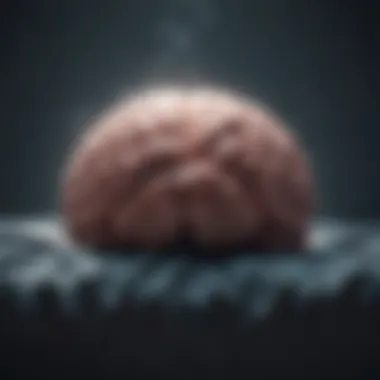The Profound Impact of Sleep Deprivation on Mental Health


Understanding Sleep Deprivation and its Impact on Mental Health
The Concept of Mental Health
The relevance of the concept of mental health becomes evident when we consider the intricate link between sleep deprivation and psychological well-being. Mental health refers to a person's emotional, psychological, and social well-being. It impacts how individuals think, feel, and act, influencing how they handle stress, relate to others, and make choices. Prioritizing mental health involves recognizing and addressing mental health challenges and disorders to maintain overall well-being.
Significance of Prioritizing Mental Well-being
Prioritizing mental well-being involves valuing and nurturing one's emotional and psychological health. It is essential for individuals to proactively maintain their mental health to lead fulfilling lives. Neglecting mental well-being can have detrimental effects on cognitive function, emotional stability, and overall quality of life. By recognizing the importance of mental health, individuals can take steps to improve their mental well-being and prevent the negative consequences of neglect.
Common Mental Health Challenges and Disorders
Common mental health challenges and disorders encompass a wide range of conditions that affect mood, behavior, and thinking patterns. These may include depression, anxiety disorders, bipolar disorder, schizophrenia, and more. Understanding these challenges is crucial in identifying symptoms, seeking appropriate help, and implementing effective coping strategies. Mental health challenges can manifest differently in individuals and require varying levels of care and intervention. Recognizing the signs and symptoms of common mental health disorders is instrumental in promoting early intervention and proper management.
Introduction
In our exploration of the intricate relationship between sleep deprivation and mental health, we uncover the profound impact that inadequate rest can have on our psychological well-being. The essence lies in understanding how insufficient sleep not only affects our physical state but also delves deep into the realms of cognitive function, emotional stability, and overall mental wellness. By delving into the repercussions of sleep deprivation on our mental faculties, we shed light on the critical nature of ensuring proper rest for optimal mental health.
Definition of Sleep Deprivation
Sleep deprivation stands as a condition where an individual consistently fails to obtain the requisite amount of sleep needed for bodily and mental rejuvenation. This deprivation can arise from various factors such as lifestyle choices, work demands, or underlying health conditions. It goes beyond mere tiredness, encompassing a state where the mind and body struggle to function at an optimal level due to a chronic lack of rest. Understanding this definition forms the bedrock for appreciating the profound implications it holds for mental well-being.
Significance of Mental Health
Mental Health Overview
The domain of mental health overview scrutinizes the intricate balance between cognitive, emotional, and behavioral facets of human psychology. By dissecting individual components such as cognition, emotional regulation, and psychological well-being, mental health overview grants us insight into the complex workings of the mind. Its significance in this article lies in how it illuminates the pivotal role mental health plays in shaping our overall well-being. The structured approach to understanding mental health overview provides a holistic view that is invaluable in comprehending the repercussions of sleep deprivation on our psychological state.
Purpose of the Article
This article aims to unravel the multifaceted impact of sleep deprivation on mental health, positioning itself as a guidepost for individuals seeking to fortify their cognitive and emotional resilience. By offering a detailed analysis of how inadequate sleep patterns can disrupt cognitive processes, destabilize emotional regulation, and contribute to psychological distress, this piece serves as a beacon for those striving towards achieving optimal mental wellness. The purpose, therefore, is to underscore the critical need for prioritizing sufficient rest as a fundamental pillar of mental health maintenance.
The Link Between Sleep and Mental Health
Understanding the connection between sleep and mental health is crucial in dissecting the impacts of sleep deprivation on the mind. By delving into the intricate interplay between these two facets, we uncover a profound relationship that influences overall well-being. This exploration sheds light on how disruptions in sleep patterns can significantly affect mental functions, emotional stability, and cognitive processes. Recognizing this correlation is vital in addressing the importance of rest for optimal mental wellness.


Biological Impact of Sleep Deprivation
Neurotransmitter Imbalance
The concept of neurotransmitter imbalance stands at the core of the biological impact of sleep deprivation. This imbalance pertains to the disruption of essential chemicals in the brain responsible for transmitting signals between neurons. Such disturbances can lead to various mental health issues due to altered communication within the brain. Understanding the nuances of neurotransmitter imbalance contributes significantly to comprehending the broader implications of inadequate sleep on mental well-being. The unique characteristic of this imbalance lies in its ability to disrupt neural pathways, impacting mood regulation, cognitive functions, and overall mental stability.
Impact on Brain Function
Exploring the impact of sleep deprivation on brain function reveals its integral role in influencing mental health. The effects of inadequate sleep on brain processes encompass impairments in cognitive abilities, emotional responses, and decision-making skills. By highlighting these repercussions, we illuminate the critical role that proper rest plays in sustaining optimal brain performance. Understanding the unique features of how sleep deprivation impacts brain function enables a deeper insight into the advantages of prioritizing quality sleep for maintaining mental acuity.
Cognitive Impairment
Memory Deficits
Memory deficits represent a key element of cognitive impairment resulting from sleep deprivation. These deficits manifest as difficulties in retaining and recollecting information due to inadequate rest. The central characteristic of memory deficits lies in their direct correlation to the quality and quantity of sleep, showcasing the significant role of proper rest in preserving cognitive functions. Recognizing the intricate connection between sleep, memory, and cognitive abilities underscores the importance of addressing sleep deprivation to mitigate memory-related impairments.
Attention and Concentration Issues
Insufficient sleep contributes to attention and concentration issues that hamper cognitive performance. These issues arise from the brain's inability to focus and maintain attention due to sleep deprivation. The key characteristic of attention and concentration issues lies in their impact on daily activities and mental tasks, affecting productivity and cognitive efficiency. By understanding the unique features of these issues, individuals can appreciate the advantages of prioritizing adequate sleep to enhance attention and concentration abilities.
Emotional Regulation
Increased Irritability
Increased irritability serves as a prominent consequence of sleep deprivation on emotional regulation. This aspect pertains to heightened sensitivity to various stimuli, leading to outbursts and mood disturbances. The key characteristic of increased irritability is its propensity to affect interpersonal relationships and emotional well-being, highlighting the importance of managing emotional responses through adequate rest. By recognizing the unique features of increased irritability, individuals can address emotional disturbances effectively, promoting healthier emotional regulation.
Emotional Instability
Emotional instability emerges as another critical aspect influenced by sleep deprivation, impacting mood fluctuation and emotional resilience. This instability reflects challenges in maintaining emotional equilibrium and coping with stressors due to disrupted sleep patterns. The key characteristic of emotional instability lies in its pervasive effects on mental health and overall well-being, emphasizing the need for addressing sleep deprivation to stabilize emotional responses. Understanding the unique features of emotional instability underscores the advantages of prioritizing rest for emotional regulation and stability.
Psychological Well-being
Stress and Anxiety
The prevalence of stress and anxiety increases significantly with sleep deprivation, affecting psychological well-being. This aspect encompasses heightened levels of stress hormones and persistent anxiety symptoms attributed to inadequate rest. The key characteristic of stress and anxiety lies in their disruptive impact on mental health, underscoring the importance of prioritizing sleep for managing these conditions. Recognizing the unique features of stress and anxiety emphasizes the advantages of adequate rest in reducing psychological distress and enhancing overall well-being.
Depression Symptoms


Sleep deprivation contributes to the exacerbation of depression symptoms, intensifying feelings of sadness and hopelessness. These symptoms manifest as persistent low mood, loss of interest, and changes in appetite or sleep patterns due to inadequate rest. The key characteristic of depression symptoms lies in their profound impact on daily functioning and quality of life, necessitating attention to sleep hygiene for alleviating depressive tendencies. Understanding the unique features of depression symptoms highlights the advantages of addressing sleep deprivation to mitigate the effects of depression on psychological well-being.
Effects of Sleep Deprivation on Mental Health
Sleep deprivation has a profound impact on mental health, a critical aspect explored extensively in this article. The consequences of inadequate sleep permeate various facets of mental well-being, encompassing cognitive functions, emotional stability, and overall psychological health. By delving deep into the effects of sleep deprivation on mental health, we unravel a complex web of interconnected issues that underscore the significance of prioritizing adequate rest for optimal mental wellness.
Risk of Developing Mental Disorders
Anxiety Disorders
Anxiety disorders play a pivotal role in the realm of mental health implications stemming from sleep deprivation. This specific aspect of mental disorders entails a heightened state of unease, fear, and worry that can escalate due to insufficient sleep. The primary characteristic of anxiety disorders lies in the persistent and excessive levels of anxiety experienced by individuals, showcasing why it holds substantial relevance in the context of this article. The unique feature of anxiety disorders is their ability to exacerbate under conditions of sleep deprivation, amplifying both the frequency and intensity of anxiety symptoms, thus illustrating its detrimental effects on mental health.
Mood Disorders
In the realm of mental health disorders exacerbated by sleep deprivation, mood disorders stand out as a significant contributor to the overall topic. Mood disorders encompass disturbances in an individual's emotional state, including conditions such as depression and bipolar disorder, which can be exacerbated by inadequate sleep. The key characteristic of mood disorders is the pervasive disruption of an individual's emotional equilibrium, emphasizing why it is a crucial focal point for this article. Mood disorders' unique feature lies in their susceptibility to worsen with sleep deprivation, highlighting the detrimental impact of insufficient rest on mental well-being.
Impact on Social Interactions
Communication Challenges
The impact of sleep deprivation on social interactions manifests through communication challenges, significantly influencing individuals' ability to effectively engage with others. Communication challenges encompass difficulties in articulation, comprehension, and interpersonal exchanges that can be exacerbated by lack of sleep. The key characteristic of communication challenges is their propensity to hinder smooth and coherent communication, making it a pertinent consideration in this article. The unique feature of communication challenges is their potential to heighten under conditions of sleep deprivation, magnifying misinterpretations and impairing social dynamics, thereby underscoring their adverse effects on mental health.
Relationship Strain
Another critical aspect influenced by sleep deprivation is relationship strain, marking a substantial contribution to the overarching theme of social interactions and mental health repercussions. Relationship strain encompasses tensions, conflicts, and breakdowns in interpersonal relationships that can be exacerbated by inadequate sleep. The key characteristic of relationship strain is the strain experienced in connections with others, elucidating its relevancy in this article. The unique feature of relationship strain lies in its exacerbation with sleep deprivation, intensifying conflicts and distancing individuals from meaningful social bonds, highlighting the negative impact of insufficient sleep on mental well-being.
Behavioral Changes
Impulsivity
The realm of behavioral changes induced by sleep deprivation encompasses impulsivity, a significant factor contributing to alterations in cognitive and emotional regulation. Impulsivity involves hasty decision-making, risk-taking behaviors, and a lack of inhibition that can be accentuated by inadequate rest. The key characteristic of impulsivity is the impulsive and reckless actions undertaken by individuals, emphasizing its importance in this article. The unique feature of impulsivity is its propensity to heighten with sleep deprivation, intensifying impulsivity and jeopardizing rational decision-making, thus accentuating its adverse effects on mental health.
Reduced Emotional Resilience
Another critical behavioral facet affected by sleep deprivation is reduced emotional resilience, playing a vital role in understanding the impact on mental well-being. Reduced emotional resilience entails heightened reactivity, decreased coping mechanisms, and vulnerability to stressors, all exacerbated by lack of adequate sleep. The key characteristic of reduced emotional resilience is the diminished emotional fortitude and adaptability during challenging situations, underlining its relevance in this article. The unique feature of reduced emotional resilience is its susceptibility to deteriorate under conditions of sleep deprivation, amplifying emotional volatility and compromising effective stress management, thereby emphasizing its detrimental effects on mental health.


Strategies for Improving Sleep and Mental Well-being
Strategies for improving sleep and mental well-being play a pivotal role in combating the detrimental effects of sleep deprivation on mental health. In this article, we delve into the essential practices and techniques that can enhance both the quality of sleep and overall mental wellness. By focusing on specific elements such as establishing a sleep routine, creating a relaxing sleep environment, practicing mindfulness, and seeking professional help, individuals can proactively address sleep-related issues and promote mental well-being.
Sleep Hygiene Practices
Establishing a Sleep Routine
Discussing the importance of establishing a sleep routine is crucial in fostering healthy sleep habits. A consistent bedtime and wake-up time can regulate the body's internal clock, aiding in falling asleep faster and improving sleep quality. This structured approach to bedtime enhances the body's natural circadian rhythm, promoting a more restful sleep and contributing to overall mental well-being.
Creating a Relaxing Sleep Environment
Creating a relaxing sleep environment involves optimizing the bedroom setting for optimal rest. Factors such as controlling room temperature, minimizing noise disruptions, and ensuring comfortable bedding can significantly impact sleep quality. By curating a tranquil and soothing sleep space, individuals can diminish sleep disturbances, promote relaxation, and facilitate a deeper, more rejuvenating sleep cycle.
Mindfulness and Relaxation Techniques
Meditation
Meditation serves as a powerful tool in cultivating mindfulness and combating the effects of stress and anxiety on sleep. The practice of meditation involves focusing the mind on the present moment, promoting relaxation, reducing racing thoughts, and calming the nervous system. Incorporating regular meditation sessions before bedtime can help individuals unwind, alleviate mental tension, and prepare the body for a restful night's sleep.
Deep Breathing Exercises
Deep breathing exercises are an effective technique for promoting relaxation and reducing physiological arousal before sleep. By practicing deep breathing exercises, individuals can lower heart rate, decrease stress hormone levels, and induce a state of relaxation conducive to sleep. Incorporating deep breathing into nightly bedtime routines can enhance sleep quality, improve mental clarity, and contribute to overall mental well-being.
Professional Help and Support
Therapeutic Interventions
Therapeutic interventions, such as cognitive-behavioral therapy for insomnia (CBT-I), offer evidence-based approaches to addressing sleep disorders and mental health concerns. CBT-I focuses on restructuring negative thought patterns, developing healthy sleep habits, and addressing underlying psychological factors contributing to sleep disturbances. By engaging in therapeutic interventions tailored to sleep issues, individuals can experience lasting improvements in sleep quality and mental health.
Counseling Services
Counseling services provide a safe and supportive environment for individuals to explore underlying emotional challenges impacting sleep and mental well-being. Through confidential sessions with trained therapists, individuals can address stressors, anxieties, and psychological issues that may be disrupting sleep patterns. By seeking counseling services, individuals can gain valuable insights, coping strategies, and emotional support to navigate sleep-related concerns and enhance overall mental well-being.
Conclusion
In grasping the entirety of the discourse, understanding the far-reaching consequences of sleep deprivation on mental health becomes paramount. The essence of this segment delves deep into the repercussions of inadequate sleep patterns on one's cognitive faculties, emotional equilibrium, and overall psychological well-being. By amplifying the stark realities of the interplay between sleep deficiency and mental health, a clarion call emerges for individuals to prioritize quality rest as a linchpin for safeguarding their mental wellness. This crucial section acts as a beacon, illuminating the path towards recognizing and rectifying the detrimental effects of sleep insufficiency before they culminate in more severe mental health issues.
Summary of Key Points
Importance of Prioritizing Sleep for Mental Health
Emphasizing the primacy of sleep in cultivating optimal mental health unveils a cornerstone approach to holistic wellness. By foregrounding the significance of adequate rest, individuals can proactively fortify their cognitive acuity, bolster emotional resilience, and fortify their psychological fortitude against the ravages of modern-day stressors. Prioritizing sleep not only augments one's capacity to navigate cognitive challenges with efficacy but also nurtures a robust emotional scaffold that buffers against the onslaught of mental health concerns. Understanding the pivotal role of quality sleep in enhancing mental vitality underscores the imperative for individuals to recalibrate their lifestyle choices and accord due reverence to the nocturnal balm that rejuvenates both body and mind.















